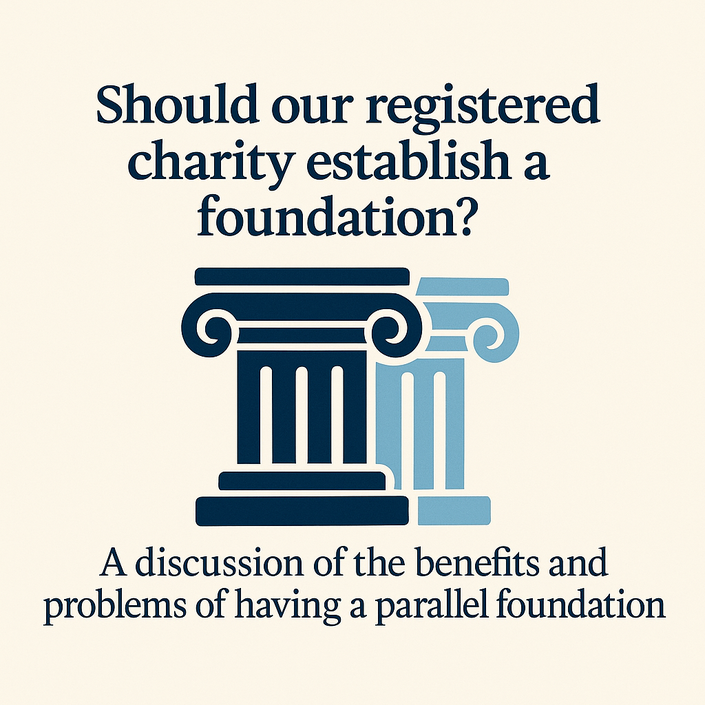
Should Our Registered Charity Establish a Foundation?
This course focuses on the pros and cons of establishing a parallel foundation of a registered charity
Enroll in Course
This course will discuss when it may be advantageous for a Canadian registered charity to create an additional registered charity, sometimes referred to as a parallel foundation. Such a charity could be involved in fundraising, accumulating long-term funds or endowments, or holding certain property such as real estate or intellectual property.
In this course, we will discuss:
- Introduction and Overview of Course
- Who should care about Parallel Foundations?
- Some Resources Included in Course
- Issues to Consider
- Options for Structuring an Initiative for Public Good such as a Social Enterprise, Non-profit or Charity
- Benefits of Multiple Structures Working Together
- Key Considerations
- Timelines and Legal Costs
- Discussion - Parallel Foundation that is a registered charity
- Discussion – NPO instead of a registered charity
- Some potential advantages of having a parallel foundation
- Some potential disadvantages of having a parallel foundation
- Some Bad Reasons to Set Up a Parallel Foundation
- Control and Alignment
- Qualified Donees
- Incorporation and Organization of Non-Profit Corporation
- Charitable Purposes
- How to Apply for Registered Charity Status
- Restrictions on Canadian Registered Charities
- CRA’s Application Review Process
- Why Charity Applications Fail (according to CRA)
- Myths About Charity Registration
- Tips and Tricks for a Successful Charity Application
- Conclusion
This course will be of interest to those working typically in large Canadian registered charities, or their professional advisors, considering whether it makes sense to establish one or more registered charities for the existing registered charity. It might also be of interest to funders and government agencies wanting to understand why groups would set up a parallel foundation. It might also be helpful for groups who have a parallel foundation and are wondering whether it still makes sense to maintain the parallel foundation.
Your Instructor

Mark Blumberg is a lawyer at the law firm Blumbergs Professional Corporation (Blumbergs) in Toronto and works almost exclusively advising non-profits and registered charities on their work in Canada and abroad. Mark has written numerous articles, is a frequent speaker on legal issues involving charity and not-for-profit law. He is the editor of a blog, www.CanadianCharityLaw.ca, and created the largest portal of data on the Canadian charity sector, www.CharityData.ca Mark also edits www.SmartGiving.ca, which provides information on due diligence when selecting charities.
Mark is particularly interested in the regulation of non-profits and charities in Canada, philanthropy, transparency requirements for the voluntary sector, providing accessible information on regulatory issues, and the use of data to make more informed decisions on the charity sector.
Mark is quoted regularly in print media and frequently appears on radio and television on topics relating to philanthropy and the regulation of charities in Canada. Mark has also appeared on a number of occasions in front of the House of Commons Standing Committee on Finance on topics such as charity regulation, transparency, accountability and tax incentives for philanthropy. Mark has testified at the Special Senate Committee on the Charitable Sector, the Standing Senate Committee on National Finance and the House Committee on Access to Information, Privacy and Ethics.
Mark has also made presentations to the Charities Directorate Annual All Staff Meeting as well the Annual Divisional Staff Meeting of the Determinations Section of Charities Directorate. Mark presented to the Financial Action Task Force (FATF) when the FATF conducted an evaluation of anti-money laundering and counter-terrorism in Canada in 2015.
Mark sat for 4 years on the Charities Directorate Technical Issues Working Group, which is a bi-annual meeting between the Charities Directorate, the Department of Finance and the charity sector to discuss technical and policy issues pertaining to registered charities and the Income Tax Act (Canada). Mark is a member of the Exempt Organizations Committee of the American Bar Association. Mark spent 6 years on the Advisory Committee for the Master of Philanthropy and Nonprofit Leadership (MPNL) at Carleton University. Mark is on the Board of the Canadian Charity Law Association.
Mark has co-authored 20 Questions Directors of Not-for-Profit Organizations Should Ask About Mergers (Published by CPA Canada) and co-wrote a chapter on International Trends in Government-Nonprofit Relations: Constancy, Change, and Contradictions in Non-profits and Government: Collaboration and Conflict in Non-profits and government: collaboration and conflict (Edited by Elizabeth T Boris and C Eugene Steuerle)
Mark frequently lectures to various industry and professional groups on charity compliance issues including the Chartered Professional Accountants Canada (CPA Canada), as well as CPA Ontario, BC and Alberta, the Canadian Bar Association, Ontario Bar Association, Canadian Association of Gift Planners, Association of Fundraising Professionals, Ontario Hospital Association, Ontario Non-profit Network, and many other organizations.
Mark has a B.A. in Political Science from the University of Toronto, an LLB from the University of British Columbia and an LLM from Osgoode Hall Law School in Tax Law.
